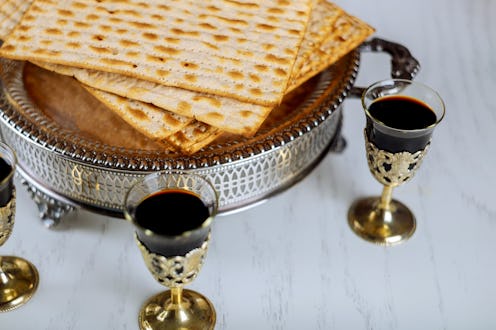Passover
Here's How To Tell Which Alcoholic Drinks Are Kosher For Passover
L’chaim!

Spring is here, which means Passover is right around the corner. The holiday (also known as Pesach) commemorates the Israelites’ exit from ancient Egypt, and it comes with a certain set of dietary restrictions. While not every Jewish person opts to go kosher for Passover, or kosher at all, if you plan to drink with Jewish family and friends during the week of Passover — that’s April 22 - 30, 2024 — do your best to be respectful, especially if you’re attending a seder (a traditional Passover meal). When in doubt about what to bring or what’s OK, ask your host.
All kosher for Passover food is kosher, but not all kosher food is kosher for Passover. “Kosher” just means the food has been prepared according to Jewish dietary laws. Broadly, that means no mixing meat with dairy and no shellfish (though there are more nuanced guidelines beyond that). If a product is kosher, it’ll likely have an “OU” symbol on the label. Some Jews eat non-kosher food year-round, but opt to observe this holiday by eating “kosher for Passover.”
As the story goes, when the Israelites fled, there was no time to let their baking bread rise. Instead, they put matzo on their backs, and it baked in the hot sun. That’s why many Jewish people keep kosher for Passover — that is, they avoid hametz, anything made from wheat, barley, spelt, rye, or oats, during the eight-day celebration. Some people simply won’t eat these foods, while others remove them from their houses entirely. If a product is kosher for Passover, it’ll likely have an “OU-P” symbol on the label.
Whether you’ve celebrated Passover your whole life or you’re attending your first seder this year, it doesn’t hurt to check the ingredient list on your favorite adult beverages. Below, here’s a handy guide that breaks down which drinks are kosher for Passover and which should be saved for after the holiday ends.
Wine
Wine is actually a part of the seder! It’s traditional to drink four cups. However, what goes in the cups depends on how observant you are. All wines are made from fermented grapes, not fermented grains. However, some Jewish people only drink kosher wine, which means they’re free of non-kosher ingredients and have been produced exclusively by Jewish workers who observe the Sabbath. Kosher for Passover wine follows those same rules and goes one step further. It’s made in a cellar free of hametz and skips the leavening agents used by many wineries. If a wine is kosher for Passover, it’ll say so on the label.
Tequila
Made from agave, regular or tequila blanco is the recommended option for those keeping kosher. The aging process necessitated by other types of tequila, like gold or reposado, calls into question its kosher for Passover status for some. There are certain tequilas that are kosher for Passover, including Patron Silver and Mezcal Amaras Cupreata, but you can see a comprehensive list from The Supervisores en Calidad Kosher of Mexico on tequilas that are kosher for Passover here.
Vodka
All domestic vodkas produced from 100% neutral grain spirits are kosher, while imported selections require certification. As for vodkas that are kosher for Passover? If it's potato-based instead of wheat, you should be fine.
Spiked Seltzers
You’ll want to look for a kosher certification before you crack open a hard seltzer. It’s a bit of a toss-up whether a given seltzer is made with any wheat, rye, or barely, and it really depends on the brand. While White Claw is not kosher-certified, Vizzy Hard Seltzer is kosher, and so is Coors Seltzer.
Beer
Any beer made with wheat, barley, spelt, rye, or oat is not kosher for Passover. Unfortunately, this makes up the majority of the beer market. But don’t worry — if cracking open a cold one during Passover sounds irresistible, there are some options out there. Companies like Boulevard Brewing Co. and Matt Brewing Co. make a number of certified kosher beers.
Bourbon
Because many Jews abstain from consuming anything that contains fermented or leavened grain, bourbon is usually off the table during Passover. Bourbon is, by definition, produced from at least 51% maize, and the rest is some form of grain, like rye, barley, oats, or wheat.
Scotch
Scotch can either be single or double malt. Regardless of the type, if the scotch is listed as aged in sherry casks, then it’s not recommended as kosher. You should also check the label and avoid anything that says double or triple finish or matured, dual casks or finish, European or French casks, Madeira finish, port, sauterne, sherry, or other wine casks.
Whiskey
Blended whiskeys need to be certified as kosher. Check with your rabbi if shots are the order of the day. A few popular certified kosher whiskeys include Jack Daniel’s Black Label, Gentleman Jack, Old Number 27 and 37, and Single Barrel.
Rum
Rum generally requires certification to be considered kosher. Unflavored rum is generally recommended, but keep an eye on the label for any wording suggesting it was finished or aged in wine casks (which is typically considered not kosher).
L'chaim!
This article was originally published on